|
|
|
Sort Order |
|
|
|
Items / Page
|
|
|
|
|
|
|
| Srl | Item |
| 1 |
ID:
141986
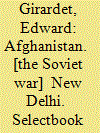

|
|
|
|
|
| Publication |
New Delhi, Selectbook service syndicate, 1986.
|
| Description |
259p.hbk
|
|
|
|
|
|
|
|
|
|
|
|
Copies: C:1/I:0,R:0,Q:0
Circulation
| Accession# | Call# | Current Location | Status | Policy | Location |
| 027492 | 958.104/GIR 027492 | Main | On Shelf | General | |
|
|
|
|
| 2 |
ID:
132344
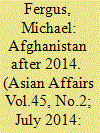

|
|
|
|
|
| Publication |
2014.
|
| Summary/Abstract |
A number of the NGOs now working in Afghanistan, like Oxfam, Afghan Aid and the Agha Khan Foundation have been there for many years and show no sign of planning to leave when NATO troops withdraw. This article is written by a committee member of the Norwegian Afghanistan Committee, which was formally established in Bergen in 1980, as a political reaction to the Soviet invasion. In 1983, the Committee started sending health workers into unoccupied areas of the country and their activities have continued ever since, though the Soviets left nearly a quarter of a century ago. The goodwill and contacts built up over time by the Committee and other NGOs have been important in validating their presence, their activities and their motives. To be useful in Afghanistan needs a commitment to the long haul.
|
|
|
|
|
|
|
|
|
|
|
|
|
|
|
|
| 3 |
ID:
029618
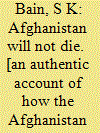

|
|
|
|
|
| Publication |
Calcutta, Satyam shivam, 1982.
|
| Description |
xvi, 166p.pbk
|
|
|
|
|
|
|
|
|
|
|
|
Copies: C:1/I:0,R:0,Q:0
Circulation
| Accession# | Call# | Current Location | Status | Policy | Location |
| 021432 | 958.1/BAI 021432 | Main | On Shelf | General | |
|
|
|
|
| 4 |
ID:
140161
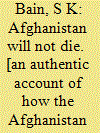

|
|
|
|
|
| Publication |
Calcutta, Satyam shivam, 1982.
|
| Description |
166p.pbk
|
|
|
|
|
|
|
|
|
|
|
|
Copies: C:1/I:0,R:0,Q:0
Circulation
| Accession# | Call# | Current Location | Status | Policy | Location |
| 025760 | 958.1/BAI 025760 | Main | On Shelf | General | |
|
|
|
|
| 5 |
ID:
049800
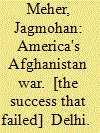

|
|
|
|
|
| Publication |
DelhI, Kalpaz Publications, 2004.
|
| Description |
325p.hbk
|
| Standard Number |
8178352621
|
|
|
|
|
|
|
|
|
|
|
|
Copies: C:1/I:0,R:0,Q:0
Circulation
| Accession# | Call# | Current Location | Status | Policy | Location |
| 047485 | 958.1046/MEH 047485 | Main | On Shelf | General | |
|
|
|
|
| 6 |
ID:
132547
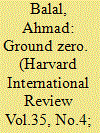

|
|
|
|
|
| Publication |
2014.
|
| Summary/Abstract |
The signing of the proposed bilateral security agreement between the US led coalition and the Afghan government is nowhere near sight, even though the declared deadline for the complete withdrawal of coalition-led forces by the end of 2014 is drawing closer everyday. This has led to a feeling of growing pessimism amongst the general public as well as those at the helm of public affairs; there is ample historic evidence to support this phenomenon. It took barely a few years for the South Vietnamese regime to fall into the hands of the North Vietnamese after the departure of US troops and drawing up on financial support, the fall of Dr. Najibullah's pro- Soviet Kabul regime to the Taliban was no different a story. While the Soviet invasion of Afghanistan was successfully thwarted when Soviet troops withdrew a decade later by an alliance whose three main partners were Saudi Arabia, Pakistan and the United States, it was the latter's unceremonious and almost sudden withdrawal from this theatre of war, which sent this region into a socio-political mayhem, which continues to date with no immediate end in sight.
|
|
|
|
|
|
|
|
|
|
|
|
|
|
|
|
| 7 |
ID:
054284
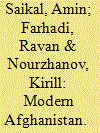

|
|
|
|
|
| Publication |
London, I B Tauris, 2004.
|
| Description |
ix, 341p.hbk
|
| Standard Number |
1850434379
|
|
|
|
|
|
|
|
|
|
|
|
Copies: C:1/I:0,R:0,Q:0
Circulation
| Accession# | Call# | Current Location | Status | Policy | Location |
| 048772 | 958.1046/SAI 048772 | Main | On Shelf | General | |
|
|
|
|
| 8 |
ID:
155844
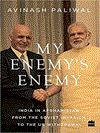

|
|
|
|
|
| Publication |
Noida, HarperCollins Publishers, 2017.
|
| Description |
xviii, 381p.hbk
|
| Standard Number |
9789352772681
|
|
|
|
|
|
|
|
|
|
|
|
Copies: C:1/I:0,R:0,Q:0
Circulation
| Accession# | Call# | Current Location | Status | Policy | Location |
| 059216 | 327.540581/PAL 059216 | Main | On Shelf | General | |
|
|
|
|
| 9 |
ID:
132415
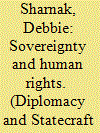

|
|
|
|
|
| Publication |
2014.
|
| Summary/Abstract |
This analysis examines the evolution of Jimmy Carter's human rights policy towards the Third World during the course of his Administration. By exploring the impact of the Soviet invasion of Afghanistan and the Soviet-backed Vietnamese invasion of Cambodia, it analyses how Carter responded to international outcry by pairing sovereignty as a human right, which specifically appealed to the concerns of newly independent nations in the late 1970s. Carter's shift is explained first by a brief outline of his initial human rights policy and stumbling blocks; second, by examining Third World responses to the dual invasions; and, finally, exploring how this affected Carter's human rights policy. It moves beyond claims that Carter abandoned his human rights agenda as he encountered an increasingly volatile international environment, instead examining the very real ways that he re-imagined this policy in the face of a changing global landscape.
|
|
|
|
|
|
|
|
|
|
|
|
|
|
|
|
| 10 |
ID:
114258
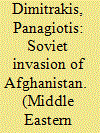

|
|
|
|
|
| Publication |
2012.
|
| Summary/Abstract |
From the outset the Soviet invasion of Afghanistan was strongly condemned by Britain and all the other NATO member states, by the non-aligned group and by key countries in Asia and the Middle East. During the first days following the invasion, London worked for the speedy build-up of a diplomatic consensus, while the Carter administration was still in a state of surprise and some confusion. It is evident that the single factor that led many countries to join forces diplomatically was the fear of further Soviet adventurism in Asia and the Middle East; uninformed, alarmist assessments of Soviet intentions played a major part in cementing a diplomatic coalition, which led to the condemnation of Moscow in the UN General Assembly - predictably, the Soviets had vetoed a Security Council resolution. Simply put, the fear of war led to something of a panic among non-aligned nations, which in turn convinced them to back western diplomacy.
|
|
|
|
|
|
|
|
|
|
|
|
|
|
|
|
| 11 |
ID:
120455
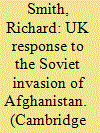

|
|
|
|
|
| Publication |
2013.
|
| Summary/Abstract |
Although not unexpected, the Soviet invasion of Afghanistan was still largely a shock to the West. It was the first time since the Second World War that the Soviets had directly intervened in a country outside the Warsaw Pact. Despite the intervention eventually being seen as Moscow's 'Vietnam' the West was initially unsure about what the invasion meant for stability in the region or the future conduct of East-West relations. In response to the crisis the UK Foreign & Commonwealth Office (FCO) proposed that Afghanistan revert to a neutral and non-aligned status in an attempt to create the basis for a viable political settlement, one that would allow the Soviet Union to withdraw troops without losing face. It launched the proposal in early 1980, lobbying other countries to support and champion the idea, culminating in a visit to Moscow by the Foreign Secretary, Lord Carrington, in July 1981. In this early phase of Soviet intervention the British proposals were premature but not without merit. They anticipated the strategy the Soviets would eventually adopt in their attempt to achieve an orderly withdrawal.
|
|
|
|
|
|
|
|
|
|
|
|
|
|
|
|
| 12 |
ID:
133759
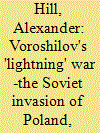

|
|
|
|
|
| Publication |
2014.
|
| Summary/Abstract |
The Soviet invasion of Poland of 17 September 1939 may not have met widespread Polish resistance, but a number of significant engagements saw the Red Army take far from insignificant losses in a rushed operation characterized by overconfidence, poor planning, and cooperation between arms and inadequate logistical support. Materials published in Russian and English since the collapse of the Soviet Union and Soviet academic hegemony over Eastern Europe now allow us to examine the Soviet conduct of the invasion in much more detail than had previously been the case. Much of the material presented here on the topic is to be included in a chapter of a monograph concerned with Soviet military effectiveness during the period of the Second World War, and comments are welcome.
|
|
|
|
|
|
|
|
|
|
|
|
|
|
|
|
|
|
|
|
|